Cricket World Cup: How England can return to winning ways
- Published
- comments
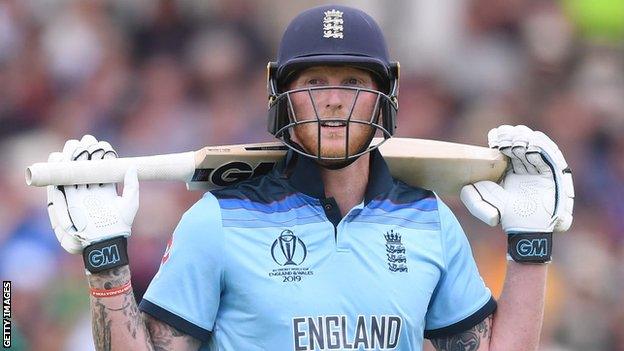
England's Ben Stokes is one of the few England batsmen to show application in the two most recent run chases
ICC Men's Cricket World Cup: England v India |
|---|
Venue: Edgbaston Date: Sunday, 30 June |
Coverage: Live Test Match Special radio and text commentary on every match on BBC Radio 5 Live Sports Extra & BBC Sport website, plus desktop, tablets, mobiles and app. |
In case there is any confusion, England are still in the World Cup.
Amid the gloom that has greeted their back-to-back defeats, or the pessimism surrounding the scale of the task that must be undertaken to reach the semi-finals, you could be forgiven for thinking Eoin Morgan's men have already been skewered.
Yes, given the option of Pakistan's run-in of games with Afghanistan and Bangladesh, or England's final two fixtures against India and New Zealand, you would take the former, and that's not considering the fact that Bangladesh themselves or even Sri Lanka could still pip the hosts.
But England's fate remains in their own hands. They can still become world champions. Here's how.
Believe
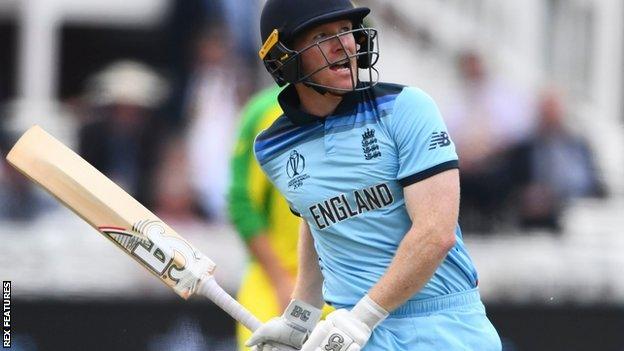
England captain Eoin Morgan hit an ODI record 17 sixes against Afghanistan but played a poor shot to get out against Australia
England beginning this World Cup as favourites and the top-ranked team was not a fluke.
They have not lost a bilateral series for more than two years and their last home defeat was in 2015. They are the best one-day team the country has ever produced, a golden generation.
But pressure and expectancy can do funny things. In the goldfish bowl of a tournament you are expected to win, belief can be eroded quickly. In the aftermath of Tuesday's loss to Australia, Morgan himself admitted that confidence has taken a hit.
It is Morgan who holds the key to restoring England to their old self. This is a team formed on his vision and the Irishman is the only part of its leadership that has remained constant since the debacle of the last World Cup.
Just recently, the skipper has made an interesting study. Usually cooler than the other side of the pillow, he has been increasingly tetchy when addressing journalists, especially after the defeat at Lord's.
He may be channelling his inner Sir Alex Ferguson and protecting his players, who will now look to him to pump the tyres before Sunday's game against India at an Edgbaston that will feel more like Eden Gardens.
"Eoin has to remind his players they are still good players, but also analyse what they are not doing well," said former England captain Alec Stewart. "There might be a few rows or raised voices, but that doesn't matter because it is about trying to win the World Cup."
Michael Vaughan, another ex-England skipper, added: "What Morgan has done for England's one-day team over four years has been remarkable, but he will be judged on what he does before Sunday. Now is the pressure time and we expect the leadership to step up."
Adapt
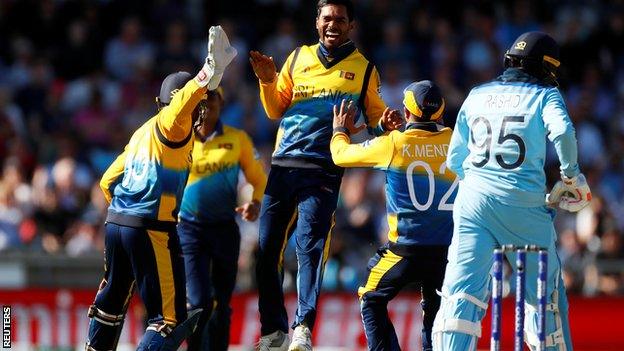
England failed to chase 233 on a difficult Headingley pitch against Sri Lanka
It is unfair to suggest England can only bully their way to victory on flat pitches when fours and sixes are thrown around like confetti.
Yes, they have butchered attacks on wickets resembling strips of concrete, but they have also won series all around the world. This past winter, they triumphed in Sri Lanka in a series where 300 was passed only once.
But it is also true that their defeats tend to come when batting needs as much brains as brawn. That has never been more evident than in the World Cup loss to Sri Lanka at Headingley, where England did not know how to chase down 233 on a slowing surface against an intelligent attack.
The bowlers have also been guilty. On a sticky morning at Lord's, they banged the ball in too short, rather than finding the fuller length that would later serve Australia so well.
In this wet summer, with groundsmen having to prepare multiple pitches at the same venue, it might be that 350 is not approached by any team for the rest of the World Cup. England must adapt.
"Somehow, they have to find a way of batting on these wickets," said Vaughan. "They have to find a method.
"They certainly have it in them to bounce back, but they have to assess the conditions better than they did at Headingley and Lord's. If they think the only way they can win is by blasting a massive score, they will be undone."
Bat first
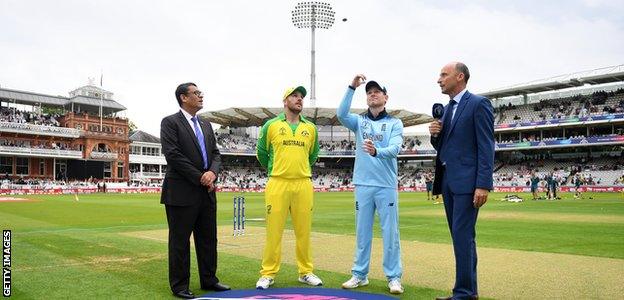
England's four wins in this World Cup have come when they batted first. They have lost on three of the four occasions they have chased
This could also come under the banner of adapting, but because it involves a shift from England's favoured method of winning one-dayers over the past four years, it deserves more explaining.
Put simply, England love to bat second. They are good at it, too. How many times have we been told that Morgan's men can "chase any target".
So happy are they in pursuit that, during the series against Pakistan that preceded the World Cup, Morgan won the toss and batted, just to replicate the scenario when the opposition won the toss and put them in.
It is far too simplistic to say that England's three defeats have come batting second, so therefore they must change. There is more to it than that.
Firstly, England are very, very good frontrunners. Twice they have crunched ODI record totals batting first.
Secondly, in tight games, where the stakes are high, the pressure of a chase can play tricks with a batsman's pysche. Yes, the conditions meant England were right to field first against Australia, but they were always going to feel the heat of Mitchell Starc in the second innings.
What might happen on Sunday if England are in a tight chase at Edgbaston, their World Cup on the line, with Jasprit Bumrah being roared on by the vocal India supporters?
"I'd like to see them bat first and get a big score on the board," said England fast bowler James Anderson. "It feels like when they are chasing, they've gone a bit safe, a bit careful.
"I want to see them bat first and go for it, just take the shackles off."
Get the team right
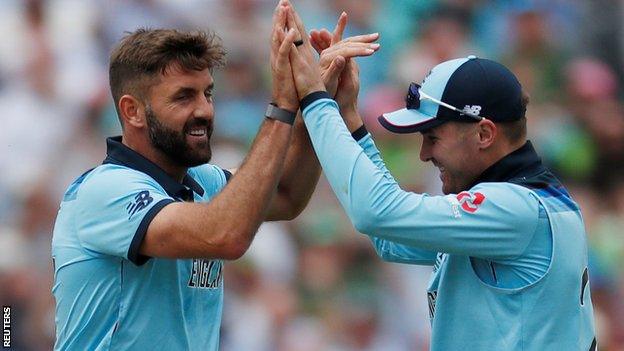
Fast bowler Liam Plunkett (left) did not play in England's three World Cup losses to Pakistan, Sri Lanka and Australia
If this one sounds obvious, it is worth remembering that there can be many variables to getting your best XI on the park.
Chief amongst them is fitness, with Jason Roy's hamstring currently the most crucial body part in an England World Cup campaign since David Beckham's metatarsal.
If Roy is fit, the resumption of his incredibly successful opening partnership with Jonny Bairstow will give England a huge boost.
If playing him would be a gamble, then England must decide how much they are willing to risk. And if he is ruled out entirely, they must decide whether or not to stick with James Vince, who somehow managed to fit his trademark beauty and the beast innings into just two balls against Australia.
Would it be folly to expect Vince, who has reached 50 only four times in 41 international innings, to suddenly produce in such pressurised circumstances? If not Vince, who? How costly Alex Hales' indiscretion seems now.
"Vince is a talented player, but he's not getting numbers," said Vaughan. "He has nothing in the bank to fall back on. I wouldn't be playing Vince on Sunday."
Joe Root, who made a century standing in for Roy against West Indies at Southampton, is one option. So too Moeen Ali, who has scored hundreds opening for England in ODIs in the past.
But it is not just the opening spot where England must consider personnel and fitness.
In the period between World Cups, no pace bowler took more wickets for England than Liam Plunkett, yet he has found himself out of the team for the three games they have lost.
That is not say that the likes of Chris Woakes, Jofra Archer and Mark Wood have not, for the most part, been bowling well, but it remains a fact that England have omitted their most prolific wicket-taker and started losing games.
On top of that, Archer struggled with a side strain before the Australia game and was below his best. Leg-spinner Adil Rashid, the leading bowler in ODIs for the past four years, has been hampered by a shoulder problem.
England have decisions to make.
Field better

Ben Stokes celebrates his outstanding catch against South Africa
Like a liar that won't look you in the eye, a sure sign of everything not being quite right is when the fielding starts to crack.
England were brilliant in the opening game against South Africa - who could forget the Ben Stokes catch? - but since then, the sloppy moments have added up.
Some will point to Woakes' quartet of catches against Pakistan or Bairstow's general boundary brilliance of all being well, but that would be to ignore other evidence.
Bairstow himself dropped two in the win against Afghanistan, Jos Buttler's errors behind the stumps are starting to mount and, for the first half of Australia's innings on Tuesday, England were as scruffy as an unironed shirt. That's before we consider the impact of Roy's crucial drop of Mohammad Hafeez in the defeat by Pakistan.
"They just didn't look like the team that hunt in packs in the field," said Vaughan.
"This England side are a good fielding team and when they have been under pressure in this tournament, they have fielded poorly. That is a mental issue, because the talent is there."